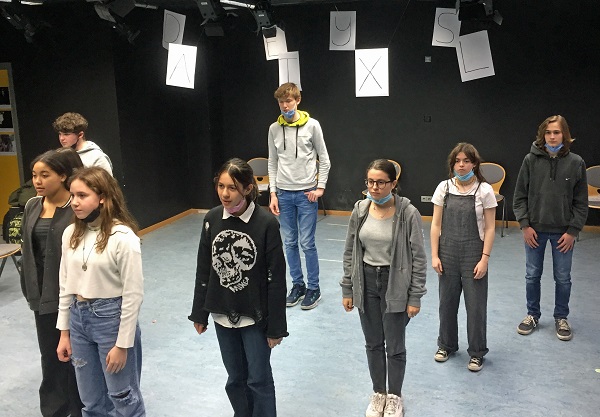 ISL students rehearsing for FEST 2022;
Credit: FEST asbl
ISL students rehearsing for FEST 2022;
Credit: FEST asbl
Chronicle.lu recently got the opportunity to speak with Tony Kingston, Bjørn Clasen and Gina Millington about the upcoming Festival of English-Language School Theatre (FEST) in Luxembourg.
Set up in 2018 by Tony Kingston, director and co-founder of the Berliner Grundtheater (BGT), FEST is a biennial event aimed at giving secondary school students in Luxembourg an opportunity to perform short one-act plays in English to the general public over one weekend.
Regarding how the festival has evolved since the first edition in 2018, Tony Kingston explained that the organisers, FEST asbl (both Mr Kingston and Bjørn Clasen are on the organising committee), had “streamlined” the event, reducing its duration from three to two days. Moreover, this year’s lineup includes slightly fewer plays (nine rather than ten in previous years), due to the participation of fewer schools – mainly due to uncertainty over COVID-19 restrictions.
Nevertheless, the aim of FEST remains unchanged: to “give young budding actors a chance to play on a bigger stage, in a public forum” and to “highlight the abilities and talent that are out there”, according to Tony Kingston.
Unlike the 2018 and 2020 editions (the latter took place just before the first lockdown in Luxembourg), preparation for this third edition has been “overshadowed by COVID-19”, Mr Kingston noted. Whilst capacity was not an issue (due to the size of the Mierscher Kulturhaus), one of the biggest challenges was recruiting schools, many of which were uncertain at the time about what the rules would be in March, as Bjørn Clasen explained. This uncertainty made it difficult to coordinate different schools, as well as the venue and catering.
Gina Millington, a regular cast member in BGT plays (Wolves Are Coming For You, We Happy Few, etc.) who will make her directing debut at FEST 2022, explained that she had experienced problems with missing students from her school group due to COVID-19. “There was never a week with the whole group together”, she said. This was particularly an issue for her group since the students were younger (some were under the age of twelve and could not get vaccinated).
Nevertheless, this year’s FEST has attracted “a lot more direct sponsorship from big organisations” compared to previous editions, according to Tony Kingston. This demonstrates the growing visibility of the event.
Another change this year involves the catering set-up, which is expected to give more of an “outdoor festival feel”, with guests dining outside in large tents, rather than the bar area inside the venue itself as in previous years. Tony Kingston described this as “an experiment”, adding: “We will see how it plays out”.
Moreover, as Bjørn Clasen explained, FEST asbl are experimenting with the festival poster design; the organisers recently launched a competition, for which they received around fifteen submissions, for the design of the poster for the next edition (in 2024). The aim was to “open up [the festival] in different ways” and to further encourage the involvement of young creatives.
Regarding how the plays are chosen for FEST, Mr Clasen explained that this was left open to the school groups themselves. The main restrictions were time and technical constraints. “Otherwise, we leave it free to the groups”. This gives the lineup a “nice variety”, he continued. Gina Millington added that she had started the year with various acting exercises and improvisation work with her group to determine their acting range and their comfort zone. She then pulled extracts from different plays and tried to see what would best fit the required running time, age range and technical availabilites.
The third edition of FEST is taking place on Friday 18 and Saturday 19 March 2022 at the Mierscher Kulturhaus in Mersch.
The full programme, as well as ticket information, is available on the FEST website: https://www.fest.lu/.








